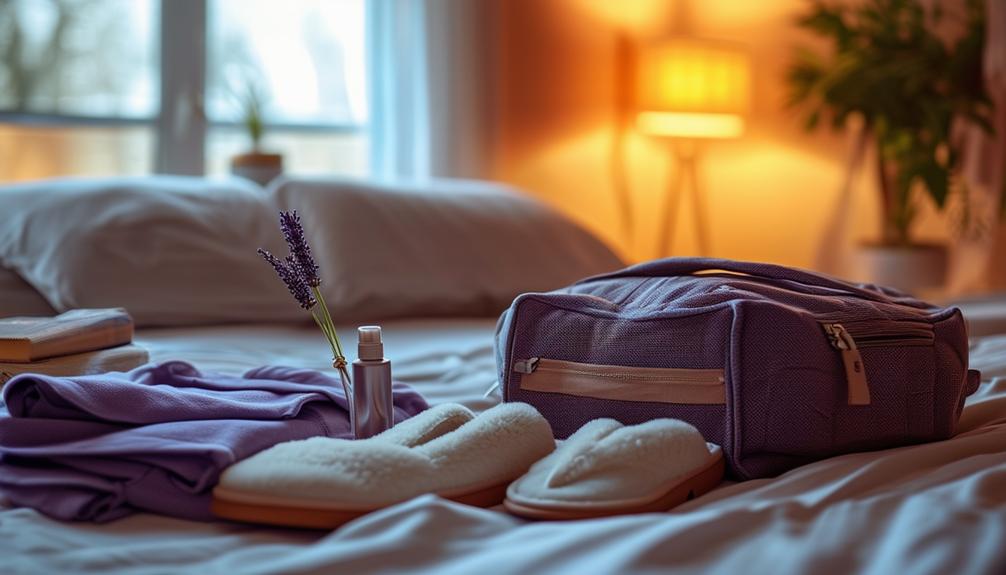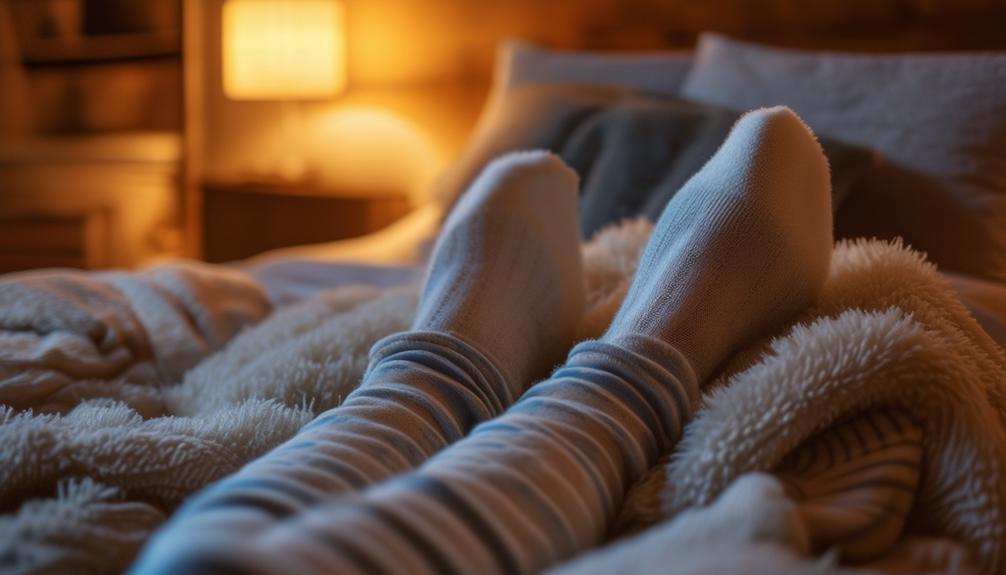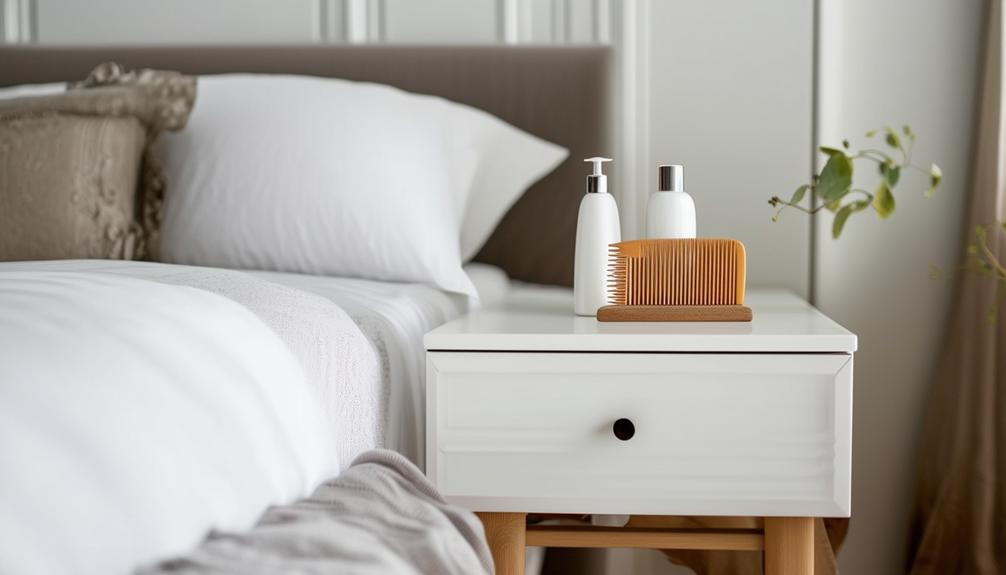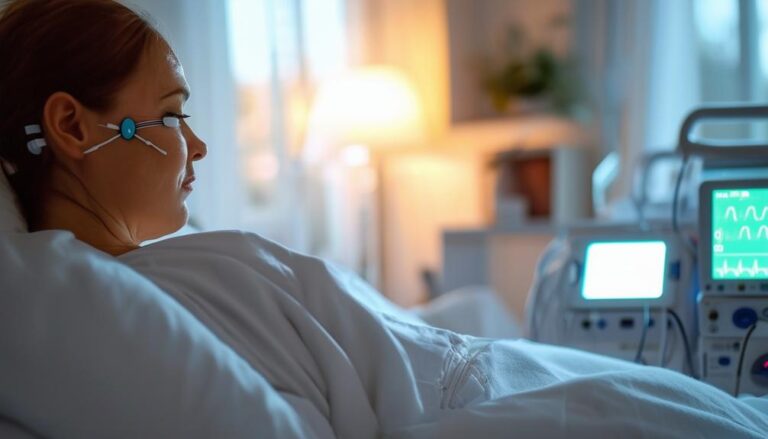7 Essential Tips for Sleep Study Preparation

To prepare for a sleep study, inform your physician about all medications, including herbal supplements and OTC drugs, as they can impact results. Avoid caffeine and alcohol for 4-6 hours pre-study; both substances disrupt sleep architecture and affect test accuracy. Pack an overnight bag with necessary items and dress in loose, comfortable clothing. Skip naps to guarantee you fall asleep naturally during the study. Eat a nutritious meal beforehand and avoid using hair products that could interfere with electrode measurements. Following these guidelines will help guarantee your sleep study provides clear, accurate data on your sleep health. To uncover further nuances, stay engaged.
Noteworthy Details
- Inform your physician about all medications, including prescription, OTC, and herbal supplements.
- Avoid caffeine and alcohol for at least 4-6 hours before the sleep study.
- Pack an overnight bag with necessary toiletries, medications, and comfort items.
- Dress in loose, comfortable clothing to aid relaxation during the study.
- Skip naps on the day of the study to ensure natural sleep onset.
Discuss Your Medications
To guarantee accurate results from your sleep study, you must inform your physician about all medications, including over-the-counter drugs and supplements. Many medications can impact sleep patterns and the outcomes of your sleep study. It's crucial to discuss any medications you're taking with your sleep specialist. This includes not only prescription medication but also herbal supplements and over-the-counter drugs. The accuracy of your sleep disorder diagnosis and the determination of an effective treatment plan heavily depend on this information.
Altering your medication regimen without consulting your healthcare provider can jeopardize the integrity of your sleep study results. Medications such as antidepressants, antihistamines, and even common decongestants can influence your sleep architecture, leading to misleading data. Therefore, it's important to discuss any adjustments with your physician. They might recommend temporary changes to your medication schedule to minimize its impact on your sleep patterns during the study.
Adhering to the medical advice provided by your physician ensures that your sleep study delivers reliable and informative results. This collaborative approach with your sleep specialist fosters a sense of belonging and trust, ultimately contributing to a successful and insightful evaluation of your sleep health.
Avoid Caffeine and Alcohol

To guarantee accurate results in a sleep study, you should avoid caffeine and alcohol 4 to 6 hours prior.
Caffeine, as a stimulant, can disrupt your sleep architecture and alter REM cycles, while alcohol can fragment your sleep and compromise data integrity.
Adhering to these guidelines will help uphold the study's reliability and provide more meaningful insights into your sleep patterns.
Effects on Sleep Quality
Avoiding caffeine and alcohol is essential before a sleep study, as these substances can greatly disrupt sleep architecture and compromise the accuracy of the test results. Caffeine, even when consumed 4-6 hours prior to your study, can cause difficulty falling asleep and disturb sleep patterns. This disruption can lead to inaccurate test results, making it harder to diagnose any sleep disorders you may have.
Alcohol, on the other hand, can fragment your sleep and reduce the time spent in restorative sleep stages. Both substances impact sleep architecture, which is vital for a precise assessment of sleep disorders. By avoiding caffeine and alcohol, you help maintain the integrity of the sleep study, ensuring that the data collected is reliable and reflective of your natural sleep patterns.
Here's a quick reference table summarizing the effects of caffeine and alcohol:
| Substance | Effects on Sleep | Resulting Issues |
|---|---|---|
| Caffeine | Difficulty falling asleep | Disrupted sleep patterns |
| Alcohol | Fragmented sleep | Reduced restorative sleep stages |
| Both | Impact sleep architecture | Inaccurate test results |
| Caffeine | Affects sleep latency | Harder to diagnose sleep disorders |
| Alcohol | Alters sleep stages | Compromises data integrity |
Impact on REM Cycles
Understanding the impact of caffeine and alcohol on REM cycles is essential for accurate sleep study results. Both substances can greatly disrupt your REM sleep, which is vital for processes like memory consolidation and emotional regulation. To guarantee your sleep study yields reliable data, it's important to avoid these stimulants.
Caffeine acts as a stimulant that interferes with your ability to fall asleep and stay asleep. It can reduce the amount of time you spend in REM sleep, leading to fragmented sleep architecture and impairing brain function. Here's why avoiding caffeine is essential:
- Disruption of Sleep Patterns: Caffeine can delay the onset of sleep and decrease total sleep time.
- Reduced REM Sleep: It limits the duration and depth of REM cycles, essential for cognitive processes.
- Sleep Fragmentation: It causes frequent awakenings, making it harder to achieve restorative sleep.
Alcohol, on the other hand, may initially sedate you but ultimately disrupts your sleep later in the night. It fragments sleep architecture and reduces REM sleep, making it harder for your brain to function at its best. Avoiding these substances 4 to 6 hours before your sleep study ensures accurate monitoring of your REM cycles, offering clear insights into your sleep health.
Timing and Duration
Ensuring you abstain from caffeine and alcohol within the essential 4 to 6 hours before your sleep study is pivotal for obtaining accurate and reliable data. Caffeine acts as a stimulant, elevating your alertness and potentially altering your natural sleep patterns. By avoiding it, you reduce the risk of prolonged sleep latency and fragmented sleep, which can skew the study's findings.
Similarly, alcohol, although often perceived as a sedative, can have a profound impact on sleep architecture. It might initially induce drowsiness but subsequently leads to disturbed sleep cycles, especially affecting REM sleep.
Proper timing and duration of abstinence from these substances are critical for accurate data collection. The 4 to 6-hour window is specifically recommended based on evidence showing their lasting effects on the central nervous system. Your preparation for the sleep study should include conscientious avoidance of caffeine and alcohol to ensure your sleep patterns are as natural as possible during the study.
This adherence helps in providing a clear and unaltered picture of your sleep health, fostering a sense of community among those committed to achieving precise and valuable sleep study results. Your commitment to these guidelines ultimately enhances the study's validity and reliability.
Pack an Overnight Bag

When packing for your sleep study, make sure to include comfortable clothing, pajamas, and essential toiletries in your overnight bag. A well-prepared bag can greatly enhance your experience and contribute to a successful study.
Here's how you can prepare and pack an overnight bag effectively:
- Toiletries: Bring your daily essentials, such as a toothbrush, toothpaste, deodorant, and any skincare products you use regularly.
- Medications and Sleep Aids: Don't forget to pack any prescribed medications and sleep aids you rely on. This will ensure your routine remains consistent, aiding in more accurate study results.
- Comfort Items: Consider including relaxing music, a favorite book, or a comforting object from home to help you unwind before bedtime.
Carefully preparing your overnight bag and including these items ensures you have everything you need for a comfortable and restful stay at the sleep center. This attention to detail can help you feel more at ease, contributing to better sleep quality and more reliable data for your study.
Dress Comfortably

After packing your overnight bag, it's important to focus on wearing loose, comfortable clothing that enhances your ability to relax and sleep well during the study. Selecting the right attire is vital for optimizing your comfort and ensuring accurate results.
Opt for pajamas or loungewear that you typically wear to bed. These familiar, comfortable clothing items can help you relax and fall asleep more easily in an unfamiliar environment.
Loose clothing without restrictive waistbands can greatly improve your comfort. Tight clothing can hinder your ability to relax and may affect your sleep quality.
Additionally, choosing breathable fabrics like cotton is essential. Breathable fabrics help regulate your body temperature, reducing the risk of overheating and ensuring you remain comfortable throughout the night.
Skip Naps

Skipping naps before your sleep study is crucial to guarantee the accurate assessment of your nighttime sleep patterns. Daytime naps can lead to nap disruption, making it harder for you to fall asleep naturally during the study. When you skip naps, you make sure you're sufficiently tired, promoting natural sleep onset even in an unfamiliar sleep environment.
Avoiding naps before your sleep study is critical for several reasons:
- Precise Data Collection: Skipping naps ensures your sleep patterns during the study reflect your typical nighttime sleep, leading to a more detailed diagnosis.
- Natural Sleep Onset: A nap-free day makes it easier for you to fall asleep naturally, even in the unfamiliar sleep environment of a sleep lab.
- Consistent Sleep Schedule: By maintaining a consistent sleep schedule, you help your body prepare for the study and increase the reliability of the results.
Following these guidelines helps optimize the conditions for your sleep study, providing your healthcare providers with the thorough and reliable data needed to evaluate your sleep quality.
Eat a Healthy Meal

Before your sleep study, choose nutrient-rich foods that sustain energy and support metabolic stability.
Avoid heavy, greasy foods to prevent gastrointestinal discomfort and potential disruptions in sleep architecture.
Aim for a balanced intake of macronutrients, including lean proteins, complex carbohydrates, and healthy fats, to optimize overall sleep quality.
Nutrient-Rich Food Choices
Ensuring you consume a balanced, nutrient-rich meal prior to your sleep study can greatly enhance the accuracy and effectiveness of the results. Eating nutrient-rich foods helps maintain stable blood sugar levels, which is essential for uninterrupted sleep. Opt for a meal that includes lean proteins, whole grains, fruits, and vegetables to support your overall health and well-being.
To achieve a balanced meal, consider the following:
- Lean Proteins: Incorporate sources like chicken, fish, or tofu. These proteins provide essential amino acids that aid in muscle repair and hormone regulation.
- Whole Grains: Choose options such as quinoa, brown rice, or whole wheat pasta. Whole grains are rich in fiber and complex carbohydrates, promoting sustained energy and stable blood sugar levels.
- Fruits and Vegetables: Include a variety of colorful fruits and vegetables. They're packed with vitamins, minerals, and antioxidants that bolster your immune system and contribute to overall health.
Avoid Heavy, Greasy Foods
Consuming heavy, greasy foods before your sleep study can greatly disrupt your digestive system and impair sleep quality. These types of foods are notorious for causing discomfort and indigestion, making it challenging to achieve the restful state necessary for accurate sleep study results.
For ideal sleep study preparation, it's essential to focus on a balanced meal that's nutritious and easy on your stomach. A diet rich in heavy, greasy foods can lead to increased gastric acid production, triggering acid reflux and other gastrointestinal issues.
This discomfort can easily wake you up during the night, interrupting the important sleep cycles that the study aims to monitor. Instead, opt for a meal that includes lean proteins, whole grains, and a variety of vegetables.
Balanced Macronutrient Intake
Instead of heavy, greasy foods, prioritize a meal with balanced macronutrients to stabilize blood sugar levels and sustain energy throughout the night. Consuming a nutritious meal rich in protein, complex carbohydrates, and healthy fats is essential for peak cognitive function and maintaining energy levels during your sleep study.
Here's a guideline to help you select the right meal components:
- Protein: Choose lean protein sources like chicken, fish, or plant-based options such as beans and lentils. Protein helps in maintaining satiety and avoiding hunger pangs during the study.
- Complex Carbohydrates: Incorporate whole grains like quinoa, brown rice, or whole-wheat pasta. These carbohydrates provide a steady release of energy, preventing fluctuations in blood sugar levels.
- Healthy Fats: Opt for sources like avocados, nuts, or olive oil. Healthy fats are essential for overall brain health and sustaining energy without causing blood sugar spikes.
Avoid high-sugar foods, as they can lead to energy crashes and disrupt sleep patterns. A well-balanced meal not only ensures stable blood sugar levels but also supports your cognitive function and alertness, which are vital for accurate sleep data collection.
Embracing these dietary choices can make your sleep study a more comfortable and effective experience.
Avoid Hair Products

Why should you avoid hair products before a sleep study?
Hair sprays, gels, and oils can greatly interfere with electrode measurements. These products create barriers that compromise the accuracy of data collection. When you use hair sprays or gels, the adhesive used to attach electrodes to your scalp may not stick properly. Similarly, oils can cause slippage, leading to unreliable readings.
Proper preparation is essential for a successful sleep study.
On the day of your study, refrain from using any hair products. This simple step guarantees that the electrodes maintain solid contact with your scalp, allowing for precise data collection. Reliable electrode measurements are crucial for diagnosing conditions like sleep apnea or insomnia accurately.
Frequently Asked Questions
What Should You Not Do Before a Sleep Study?
To guarantee accurate sleep pattern measurement and results, refrain from caffeine consumption, heavy meals, alcohol intake, intense exercise, and stress-inducing activities before a sleep study. Avoid using bright screens, taking late naps, or using tobacco.
What Can Throw off a Sleep Study?
To answer 'what can throw off a sleep study?': High stress levels, caffeine intake, medication effects, inconsistent bedtime routines, improper room temperature, light exposure, noise disturbances, and alcohol consumption can all skew results. Remember, 'a stitch in time saves nine.'
How to Get the Most Out of a Sleep Study?
To get the most out of a sleep study, optimize your sleep environment, follow good sleep hygiene, manage your medication timing, maintain healthy dietary habits, control stress with relaxation techniques, limit caffeine consumption, and reduce technology use before bed.
Can I Wear a Bra During a Sleep Study?
Choosing a comfortable bra boosts your sleep hygiene. Select a fabric choice that suits you, prefer wire-free for the best support level. Personal preference is key, ensuring nighttime comfort. Undergarment options should prioritize sensors' placement and accuracy.
Conclusion
Preparing for a sleep study doesn't have to be intimidating. Just think of Sarah, who followed these essential tips:
- She discussed her medications with her doctor.
- She avoided caffeine and alcohol.
- She packed an overnight bag and dressed comfortably.
- Skipping naps and eating a healthy meal also helped.
By steering clear of hair products, she guaranteed accurate results.
Implementing these strategies will help you feel at ease and get the most reliable data from your sleep study.





